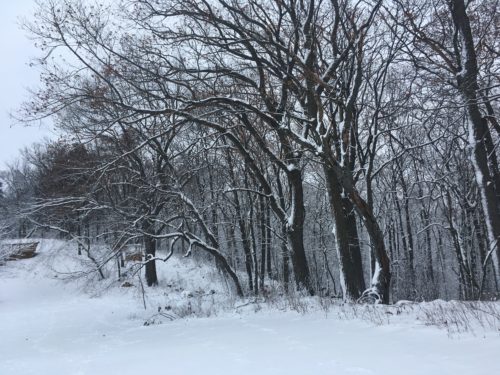Bad Connection
My husband and I married in Madison, Wisconsin four years ago and moved to his rural childhood home to lead and grow his family’s farm. Before moving here, my husband and I made a list of pros and cons of leaving to live in a rural place, where the nearest town is politically scarlet. The pros won, and we left the state’s progressive capital city for a place where many vehicles have “We Still Stand with Scott Walker” bumper stickers.
For the first few years, living in our rural area in an isolated subdivision, I commuted fifty-five miles one way to work for a communications job in the nearest city. My peer coworkers were, predictably, all male and white. They enthused over online-based video games, their favorite shows on Netflix, and Fantasy Football. They asked what I did for fun, living way out there.
Hike, I told them.
Pro: The rolling hills of the Kettle Moraine State Forest – Northern Unit are a quick drive from my home, allowing access to the epic and well-maintained Ice Age Trail and scores of other beautiful hiking, swimming, and biking spots.
* * *
I also decorate our house, I told my bro-workers. We don’t have Internet, I said.
They stared at me as if I’d confessed I couldn’t read or write.
Con: My husband and I live in a rural and faraway enough part of our Wisconsin county that no fiber optic cable for high-speed broadband Internet has been dug. We’re not in view of the line-of-sight Internet tower. Painfully slow, uber-expensive satellite Internet is our only option, a contract we signed for two years and then quit, never to use again. Now, I am enrolled as a full-time graduate student, and any work that requires the Internet—email, weekly check-ins, literary journal blog and content management—I do via the hotspot I create with my iPhone, with an unlimited data plan that still seems too limited.
One of the “pros” on our original list—the list that justified us leaving Madison—was the possibility of a tighter-knit community in a rural area. As Lunch Ticket bloggers have stated in such eloquent terms this issue, community is essential to strong mental health and survival.

Wisconsin’s Kettle Moraine State Forest – Northern Unit features superb hiking trails and autumn colors.
* * *
Pro: The lack of fast Internet encourages me to write more, enables me to be a graduate student in a low-residency MFA program, work on art and our house projects, run or bike outside for miles without seeing a single car, and get more work done for my job at the farm. There is solitude here—room to breathe.
Con: The best place to get high-speed Internet is the Starbucks nearest the well-stocked if sterile 24-hour grocery store. Most of my Internet-using time is spent in this same strip mall, a pandering line of shops with a hectic parking lot. I dislike the coffee; the dark-roasted grounds are burnt and over-extracted. I prefer the brighter, berry flavors of a single origin light roast. All those years we lived in pampered, foodie Madison made me soft and snobby, unable to withstand bad coffee. Anyway, I sit there, hour after hour, working on critical paper research using the university’s online libraries system, managing online submissions queues for the literary journal, blog posts, and weekly content. I need the Internet to be a writer—to submit to journals, apply for editorial positions, and share my work via social media. To work.
Nobody ever asks my name. Nobody memorizes my drink. I never see anyone I know at this coffee shop, which defies all previous coffee shop culture conventions—warm, conversational—I’ve ever known.
* * *
In November 2016, a little over a year after moving to our home, Trump became president of the United States. The urban-rural divide became national fodder, with some reductive voters blaming rural areas for the proliferation of “Make America Great Again” devotees. Community building here seemed bleaker by the day. 2017 and, in particular, 2018, proved atrocious for human rights. The nation stands by, mouths covered in horrified half-laughter, as this presidential administration train-wrecks itself, turns laws and morality upside-down, and persecutes immigrant families.
Pro: I can isolate myself with good reason—productivity—from booze-soaked happy hours while I work on my novel, personal essays, and short stories instead. While I’m inspired by the bustling of big cities, I need solitude to create, to find those seeds of concentration I never sowed during all those years of corporate jobs and happy hours in my late twenties.
Con: I feel like a bird on a wire, the gigabytes pulsing beneath my feet. A wide world to which I don’t have access.
Pro: Life in a lower-cost, low-density area means more money to travel, a recognized privilege I try not to take for granted.
Con: When I do have high-speed Internet—at hotels, at my Los Angeles AirBnBs when I stay during residency, in line at the ice cream stand drive-through—I glut on it. Watch five episodes in a row of “Marvelous Mrs. Maisel.” Look up ex-boyfriends’ new girlfriends’ new and different boyfriends on Facebook. Scroll, scroll, scroll, feed, feed, feed.

I rarely drive through at Starbucks, but when I do, pup gets a treat!
* * *
Pro: I get some “me” time—decompress, self-care, whatever.
Con: It’s all so lonely.
Pro: I never have to worry about parking or the neighbors’ sewage problems, or stolen Internet causing slow Hulu streaming.
Con: There is no Internet to steal.
When the management team named me blog editor and weekly content manager for Issue 15 of Lunch Ticket, I hesitated, knowing how much the position would rely on ample Internet access. The hesitation only lasted a second. I’m so honored to edit and publish personal essays about “What now?” questions, combating medical misconceptions, the ache of missing love, and the need for intersectional feminism. Social media—supplied by the omnipresent Internet—is just one way I share these works.
As much as I can, I take the opportunity to talk about these essays, in person, via text, or over the phone, to permeate a culture around me that may not be too knowledgeable of LGBTQ issues or aware of the plights of urban homelessness.
Pro: I built a community, though it’s far away.
Con: Fostering this community requires the Internet. In warm weather, when semester is in session and deadlines bear down, I have to move from room to room in my house with iPhone in tow, searching for a hotspot signal. Denser summer foliage means frequent data interruptions for those far from cellular data pinging towers.
* * *
Pro: After a string of corporate jobs in which I was told I had a strange personality to operate in a big company (Female? Youthful? Ambitious? Still not sure.), and during which I overheard catty remarks about my outfits over low cubicle walls, I vowed never to set foot in a corporate office again. I now do most of my work for the farm from home.
Con: My day job at the farm, as the compliance, communications, and HR director, is much harder than it should be. Handwritten tasks take longer and result in more human errors—I still remember the time I wrote a five instead of a four on a spreadsheet and couldn’t figure out why the books did not balance at the end of the month. Thirty-nine percent of people in rural areas still do not have access to high-speed Internet, which is considered a vital tool to run a business. Emailing invoices and vendor payments are no longer futuristic automations. They’re here to stay, and farms that cannot keep up will suffer the economic consequences.
Pro: Electric cooperatives may come to our area soon to bridge the urban-rural digital divide.
Con: It’s unlikely those cooperatives will be able to achieve the 25 megabytes per second requirement the Federal Communications Commission sets to define high-speed broadband access.
* * *

On snowy days, I follow deer paths in our backyard woods.
This is my last blog for Lunch Ticket, though I’ll edit and manage our team of bloggers through June. It’s bittersweet. I’ll miss my bloggers and connections to those in far-flung places—bigger cities and more rural places alike.
Point: Only four percent of people in urban areas don’t have access to high-speed Internet. We should all just move to big cities.
Counterpoint: Who will grow all of our food, organic, conventional, or otherwise? Crops and livestock require space and land, and farmers to grow, nurture, and oversee them. The demand for produce continues to increase, despite the proliferation of technologies and automation.
In the end, four years ago, the “pros” won. We know it will be a challenging road to run a farm, but the list doesn’t lie.
Pros: We are close to our family, our most supportive and important allies. I watch my nephews grow up. We have enough space to adopt a puppy. I see a supermoon illuminate our backyard woods. I witness 27 wild turkeys peck around in the field by our home. I try and fail to video herds of deer stampeding through our subdivision.
By helping to grow produce, we serve as an edifying counterpoint to the struggling farms that pump antibiotics into their Big Dairy cows or raise many, many cattle for beef, one of the main contributors to greenhouse gas emissions and thus climate change.
We can feed the world.
Con: Due to limited data, I can’t live stream the whole thing.


 E.P. Floyd is blog editor and weekly content manager of Lunch Ticket, and an MFA candidate in fiction at Antioch University Los Angeles. Her work is published or forthcoming in The Rumpus, Lunch Ticket, Litbreak Magazine, and Reservoir. Find her online at
E.P. Floyd is blog editor and weekly content manager of Lunch Ticket, and an MFA candidate in fiction at Antioch University Los Angeles. Her work is published or forthcoming in The Rumpus, Lunch Ticket, Litbreak Magazine, and Reservoir. Find her online at 


